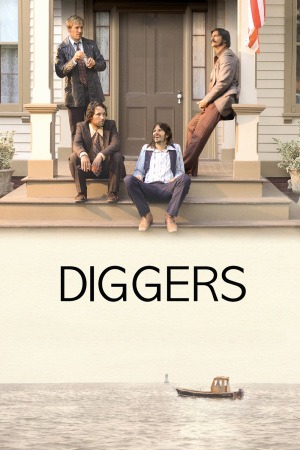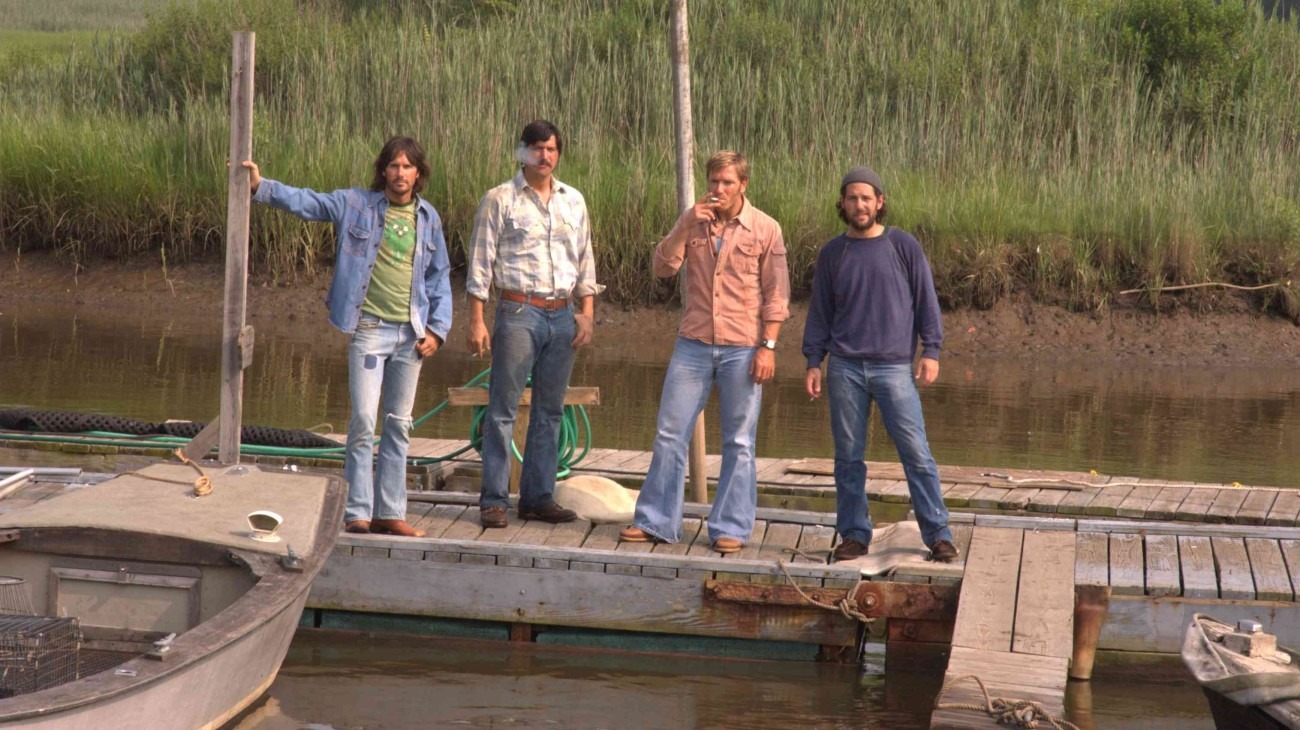
The strong, silent type
There are those who say that the wave of the future in movie-watching is in downloading and DVDs. Perhaps, but I desperately hope not. As a filmgoer, I like that sense of occasion, and of course the feeling of being in a room full of strangers sharing a common experience. As a filmmaker, well, let's just say that the idea of somebody stopping one of my movies to take a phone call fills me with a blood rage.
Which is why I'm torn about the recent spate of movies, led by Stephen Soderbergh's Bubble, to find near-simultaneous release in theaters, on HDnet and on DVD. It might well be, as we are told, that this brings these films to a wider audience than might ordinarily be the case, and if so I'm all for it. But when a film is as charming as Diggers, the most recent example of this distribution model, I kind of regret that it was effectively no chance at finding a theatrical audience, meaning that it will never have a chance to find that sense of occasion, and of being a common experience for a room full of strangers.
I would, however, be lying if I claimed that Diggers suffered mightily from life on the TV. This is a "small" film if ever there was one, a virtually plotless ninety minutes of thirtysomething guys and their female counterparts interacting with lazy, languid inevitability on Long Island during the summer of 1976. The movie is really the cinematic equivalent of cracking a beer open with some friends and hanging out on the porch on some droning summer day, and that permits for a certain lack of engagement with the proceedings. It's laid-back; much more like television than cinema.
The word "dramedy" is a word that I hate with the intensity of an exploding sun, but I don't know how else to describe Diggers: a domestic drama tinged with constant good humor? At any rate, the film concerns four clam diggers who have grown up together, dealing with the aftershocks of the death of one man's father, a veteran digger in his own right. Thankfully without giving any character a big Oscar moment, the film showcases their realisation that they've gotten stuck in aimless lives, and the time has come to either embrace that willingly or flee. Each man makes his choice.
What makes the film work is not at all the situation (we've seen how many overgrown-boys-come-of-age stories at this point?), but the characters and their interactions, and the particularity of their milieu. I'm not entirely sure whom to credit for those characters, because Diggers bears witness to an interesting challenge of authorship: written by Ken Marino, veteran of TV sketch comedy The State, and directed by Katherine Dieckmann, veteran of...The Adventures of Pete & Pete? Lord above, I haven't thought of that show in a decade or better...and the video for R.E.M.'s "Shiny Happy People," one of my least favorite videos ever-
So sorry. Anway, Dieckmann and Marino are, respectively, female and male, hence they bring two different perspectives to the same material, so that we have a script that focuses heavily on male interrelationships, directed into a treatise on the calming effect of women in a heavily masculine environment. I am aware that "the writer and director are at odds with with each other" is not usually a compliment, but in the case of Diggers it brings the final project a full range of human experience that neither filmmaker would have been capable of on their own. Movies with great men and women are much rarer than we'd like them to be, especially in the modern cinema, and it's important to salute these rare examples when they occur.
Anyway, it's not really the writer or director who deserves the most credit, it's the actors, who are all perfect. Marino keeps the most memorable character, the foul-mouthed family man Lozo, for himself, and he gets the film's best laughs; but this is a through-and-through ensemble piece, and everyone gets a chance to shine. For myself I found that I responded most to Sarah Paulson's Julie, the unsilently suffering wife of Lozo, and Paul Rudd, doing a shockingly fine job of not being broad and comic, in the most-central role of the newly orphaned son who doesn't recognise the concept of fun when it bites him on the ass. The cast is rounded out by Maura Tierney, Josh Hamilton and Ron Eldard, who are not any less fine in their performances because I haven't singled them out.
They're all wonderful people to hang out with, and I'm glad for the film that it gave me the opportunity to do so; but I would be lying if I claimed that it was some sort of masterpiece because of it. It's perfect in its own way, but that entails a distinct lack of ambition to be anything other than a drowsy slice of life. There's very little in the way of grand catharsis or emotional truths here: and certainly it is true, but only by being very tiny.
Moreover, I don't have the answers to two central questions: why is this film set in 1976, and why is it about clam diggers? The setting is too completely realised for it to be an accident - Jimmy Carter and Gerald Ford are practically characters in and of themselves, so often do they appear in the background, but there is nothing about the story per se that is essentially of the '70s, and so all of that wonderful attention to detail shades into being a distraction. As to the diggers of the title, the film could obviously only work in a working-class milieu, but clam digging is at best an esoteric working-class setting, and the film' subsequent obligation to explain an entire industry to the audience means that it makes a whole lot of unnecessary extra work for itself.
Still, these are pitiful quibbles. It is a nicely-done film that is a pleasure to watch, and it is wholly Good. A pity that it doesn't have any real desire to be Great.
7/10
Which is why I'm torn about the recent spate of movies, led by Stephen Soderbergh's Bubble, to find near-simultaneous release in theaters, on HDnet and on DVD. It might well be, as we are told, that this brings these films to a wider audience than might ordinarily be the case, and if so I'm all for it. But when a film is as charming as Diggers, the most recent example of this distribution model, I kind of regret that it was effectively no chance at finding a theatrical audience, meaning that it will never have a chance to find that sense of occasion, and of being a common experience for a room full of strangers.
I would, however, be lying if I claimed that Diggers suffered mightily from life on the TV. This is a "small" film if ever there was one, a virtually plotless ninety minutes of thirtysomething guys and their female counterparts interacting with lazy, languid inevitability on Long Island during the summer of 1976. The movie is really the cinematic equivalent of cracking a beer open with some friends and hanging out on the porch on some droning summer day, and that permits for a certain lack of engagement with the proceedings. It's laid-back; much more like television than cinema.
The word "dramedy" is a word that I hate with the intensity of an exploding sun, but I don't know how else to describe Diggers: a domestic drama tinged with constant good humor? At any rate, the film concerns four clam diggers who have grown up together, dealing with the aftershocks of the death of one man's father, a veteran digger in his own right. Thankfully without giving any character a big Oscar moment, the film showcases their realisation that they've gotten stuck in aimless lives, and the time has come to either embrace that willingly or flee. Each man makes his choice.
What makes the film work is not at all the situation (we've seen how many overgrown-boys-come-of-age stories at this point?), but the characters and their interactions, and the particularity of their milieu. I'm not entirely sure whom to credit for those characters, because Diggers bears witness to an interesting challenge of authorship: written by Ken Marino, veteran of TV sketch comedy The State, and directed by Katherine Dieckmann, veteran of...The Adventures of Pete & Pete? Lord above, I haven't thought of that show in a decade or better...and the video for R.E.M.'s "Shiny Happy People," one of my least favorite videos ever-
So sorry. Anway, Dieckmann and Marino are, respectively, female and male, hence they bring two different perspectives to the same material, so that we have a script that focuses heavily on male interrelationships, directed into a treatise on the calming effect of women in a heavily masculine environment. I am aware that "the writer and director are at odds with with each other" is not usually a compliment, but in the case of Diggers it brings the final project a full range of human experience that neither filmmaker would have been capable of on their own. Movies with great men and women are much rarer than we'd like them to be, especially in the modern cinema, and it's important to salute these rare examples when they occur.
Anyway, it's not really the writer or director who deserves the most credit, it's the actors, who are all perfect. Marino keeps the most memorable character, the foul-mouthed family man Lozo, for himself, and he gets the film's best laughs; but this is a through-and-through ensemble piece, and everyone gets a chance to shine. For myself I found that I responded most to Sarah Paulson's Julie, the unsilently suffering wife of Lozo, and Paul Rudd, doing a shockingly fine job of not being broad and comic, in the most-central role of the newly orphaned son who doesn't recognise the concept of fun when it bites him on the ass. The cast is rounded out by Maura Tierney, Josh Hamilton and Ron Eldard, who are not any less fine in their performances because I haven't singled them out.
They're all wonderful people to hang out with, and I'm glad for the film that it gave me the opportunity to do so; but I would be lying if I claimed that it was some sort of masterpiece because of it. It's perfect in its own way, but that entails a distinct lack of ambition to be anything other than a drowsy slice of life. There's very little in the way of grand catharsis or emotional truths here: and certainly it is true, but only by being very tiny.
Moreover, I don't have the answers to two central questions: why is this film set in 1976, and why is it about clam diggers? The setting is too completely realised for it to be an accident - Jimmy Carter and Gerald Ford are practically characters in and of themselves, so often do they appear in the background, but there is nothing about the story per se that is essentially of the '70s, and so all of that wonderful attention to detail shades into being a distraction. As to the diggers of the title, the film could obviously only work in a working-class milieu, but clam digging is at best an esoteric working-class setting, and the film' subsequent obligation to explain an entire industry to the audience means that it makes a whole lot of unnecessary extra work for itself.
Still, these are pitiful quibbles. It is a nicely-done film that is a pleasure to watch, and it is wholly Good. A pity that it doesn't have any real desire to be Great.
7/10






